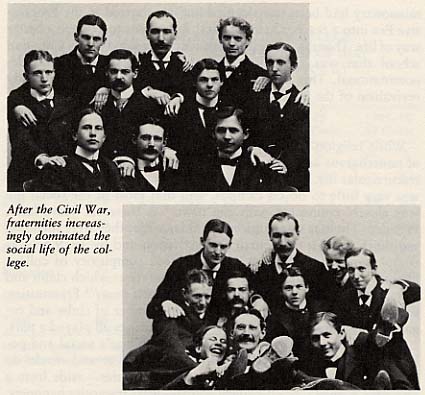|
|
Fraternities:
Opposition to
"Believing
that Secret Societies are calculated to destroy the harmony of
the College, to
create distinctions not founded on merit, to produce strife and
animosity, we feel called upon to exert ourselves to counteract
the evil tendency of such associations."
-Preamble,
constitution of Delta Upsilon fraternity, Delta Upsilon Archives,
Middlebury College (Stameshkin, The Town's College)

(Stameshkin, The Town's College)
|
Due to the mounting popularity and expanding influence of
fraternities on campus, the administration expressed concern
about students' increasing preference for socializing over
studying. President Thomas, who was particularly worried
about the prevasive social scene at Middlebury, called attention
to the fact that "the greatly increased complexity
of college life and the larger number of subsidiary interests"
distracted students from their academic obligations (Stameshkin,
261). |
\
|
Given
the exclusive nature of fraternal societies, there were
many male students at Middlebury who were not granted membership
to the fraternities on campus. These "barbarians"
or "neutrals," as they were most commonly referred
to, harbored a great deal of resentment towards the "Greeks."
Due to the growing tension between members and non-members,
many "barbarians" or "neutrals" sought
to challenge the fraternity system and, as a result, organized
their own social organizations on campus..
|
| "In athletics,
the discrimination against the Barbarians was obvious. Everything
was run by the students, and the Greeks were in control...As
a result, a mere handful of non-frat men made each year's
athletic teams." - Neutral student (Stameshkin, 262) |
| Due to the fact
that annual fraternity membership remained relatively the
same, the number of neutrals on campus increased as more and
more students desired acceptance into these elitist fraternal
societies. George E. Kimball '06 and several of his acquaintances
founded the Commons Club in 1905 to provide an alternative
social outlet for many of the neutral students at Middlebury.
After recongizing the shortcomings of the Commons Club, Kimball
and nine other members estabished Kappa Delta Rho (KDR) fraternity
on May 17, 1905. The goal of KDR was to be an intermediary
between highly selective fraternities and the Commons Club.
The founders of KDR aspired to "embody high ideals"
as a new social club that appeased both faculty and students.
Middlebury faculty hoped that the existence of KDR would counter
the "pranks, drunkenness, and elitism allowed by other
fraternities" (Stameshkin, 263). |
|
|